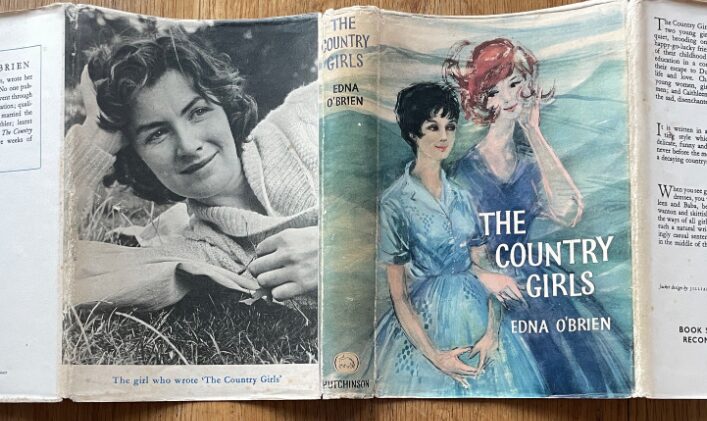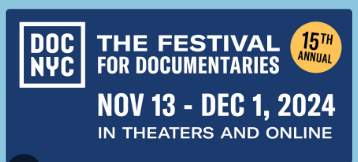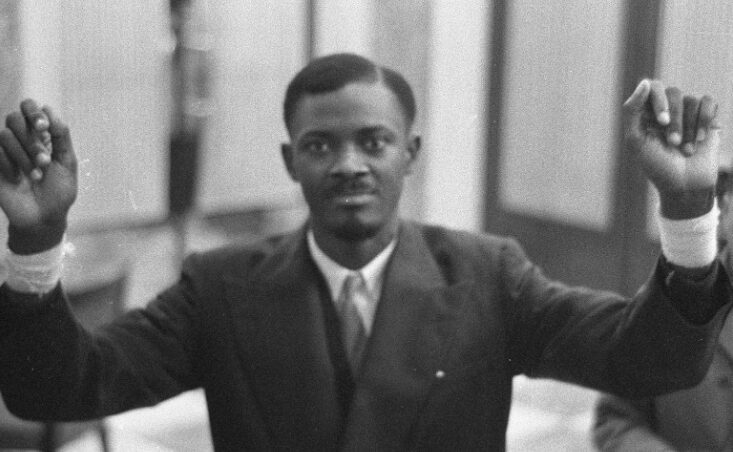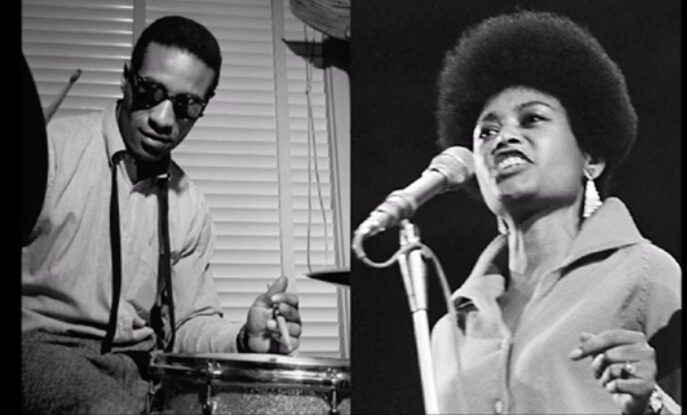DOC NYC Nov. 13–21

Spyware, an Irish author, and a Congo leader top America’s largest documentary fest
Manhattan has always had an insatiable thirst for news in both print and celluloid. For decades way back in the 20th century, travelers passing through Grand Central Station could pop into its Grand Central theater to catch up on newsreels and other non-fiction documentaries. Its modern-day downtown equivalent is the recently opened Firehouse Cinema on Lafayette Street in Chinatown, offering a daily menu of doc features, discussions, youth and continuing ed programs. And these past weeks over a dozen screens at IFC, SVA and Village East by Angelika played host to the 15th annual DOC NYC. Over 100 feature-length docs, including 31 world premieres and 24 U.S. premieres, woud test the patience (not to mention the endurance) of any newshound.
The guiding principle among an increasing number of enlarged film festivals (the New York tri-state area alone boasts over 40 fests, most neighborhood-centric) is to give as many filmmakers as possible a brief window in which to test their pictures against honest-to-goodness live theater audiences. The new reality of exhibition is that festivals are becoming the focus groups that identify a few possible successes among an ocean of orphans. Festivals used to be for taste-makers who’d steer the general public to theatrical showings; now they’re gatekeepers for test screenings that might make thecut into your living room.. The dominant gatekeeper among DOC NYC’s three major sponsors is, not surprisingly, Netflix, which has far deeper pockets than HBO Documentary Films and A&E Indie Films.

Still and all, DOC NYC’s 11th annual Visionaries Tributes embody the strength and hope that should encourage every filmmaker who made the cut. Two Lifetime Achievement Awards at this edition of DOC NYC were presented—the first to Marcia Smith, president and co-founder of the non-profit Firelight Media, which has supported over 250 filmmakers of color for a quarter century. Smith’s filmic work as writer and producer has included portraits of Harriet Tubman, Marcus Garvey, Emmett Till and Barack Obama. The other Lifetime Achievement Award went to Alan Berliner, a master memoirist. Cineaste magazine defines his work as braiding together “family, philosophy, psychology, religion, genealogy, and individual identity.” He’s made portraits of his grandfather, his father, and his cousin, the latter titled First Cousin Once Removed. Says Berliner: “All of my films end up in the cemetery.”
Lucy Walker’s work on Mountain Queen: The Summits of Lhakpa Sherpa, as well as her docs on forest fires, blind climbers tackling Mount Everest, and brain injuries from extreme sports, earned her the Robert and Anne Drew Award for Documentary Excellence. And this year’s Leading Light Award went to Jenni Wolfson, CEO of Chicken & Egg Pictures, known globally for empowering female non-profit filmmakers. A veteran human rights activist and Chicken & Egg’s first president since 2013, Wolfson has supervised over $12M in grants to 250 doc makers. Congratulations to all.
Here are Critic’s Choices in 2024 DOC NYC:
Blue Road – The Edna O’Brien Story: Sinéad O’Shea: Ireland, UK: 2024: 99 minutes

“The saying goes that nobody wants to be 90 who’s not already 89,” remarked author Richard Ford. “Which might be true of Edna, but only because she’s never really cared, inasmuch as she lives, writes, thinks, provokes, dares, thrills and thrives in the present more than anybody I know—more than any writer, for sure.” Blue Road – The Edna O’Brien Story, DOC NYC’s Opening Night selection, is a triumph in large part because director Sinéad O’Shea (with exec producer Barbara Broccoli) filmed this indelible Irish writer when she was 92, fragile and brittle but a precisionist to the teeth, and again at 93, more frail but still fully able and willing to narrate and summarize her life journey on camera. She was a storyteller to the end, just four months ago.
O’Brien grew up in a rural village in western Ireland, where she trained to be a chemist while dreaming of living next to cows. (The Country Girl is the title of her memoir). Her introduction to adult literature was a volume on James Joyce, who she’d later acknowledge by writing a biography on the author of Ulysses. Through Joyce she discovered the big city of Dublin, as well as the concept of writing about oneself via Joyce’s Portrait of the Artist as a Young Man. She steeped herself in the panting, pioneering acrobatics of Ulysses’ s eroticism. Her first novels in the early 1960s, The Country Girls, Lonely Girl (filmed as Girl with the Green Eyes with an emerging Rita Tushingham and Peter Finch) and Girls In Their Married Bliss, formed her voice in a coming-of-age trilogy. They’re the largely innocent books she’s best remembered for today.
Critically and commercially, all three novels outstripped the work of her abusive writer husband, Ernest Gebler, whose one popular novel on The Mayflower ship became MGM’s Plymouth Adventure. Edna’s tales were the first by a female Irish writer to challenge her country’s traditional views on religion and sexuality. All of her first six books were promptly banned throughout Ireland, seized from Edna at an airport, and burned by a parish priest near her parent’s home. But abroad, the books were being welcomed by America’s literary lions, especially boundary-pushing novelists like Joyce Carol Oates, John Updike, and Philip Roth. (In Zuckerman Unbound, Roth models a character after O’Brien.) Edna’s husband was enraged by it all. He never wanted her to write anything, and was unable to understand why she’d describe “bluish” road foliage as anything but green. Edna obediently signed over her meager checks to Gebler until she left him, taking custody of their two sons in a bitter divorce.
Success came fast with O’Brien’s 34 works of fiction, non-fiction, poetry, and dramas (including a play about Virginia Woolf that starred Maggie Smith). Edna took the 39,000 pounds she was paid to write a zany screenplay, Zee and Co (starring Elizabeth Taylor and Michael Caine), and bought a six-bedroom house in Chelsea that would later sell for five million dollars. She also became an international party giver and party girl. R.D. Laing helped her drop acid. She slept with Robert Mitchum, fell in and out of love easily, and became pals with Jackie Onassis and Paul McCartney. Like many women in her novels of betrayal and abandonment, she would forever search for a man “who wouldn’t spend the night telling me how much he loved his wife.” O’Shea’s doc encourages her to dote on her robustly decadent lifestyle, bemoaning a failed romance with a British politician identified only as “Lockinvar.” She reflects on and grieves the loss of her father, a handsome, snappish drinker who we watch sing a poignant version of “Danny Boy” to his daughter.
If London hardened O’Brien, it also gave her permission to deepen her literary explorations. House of Splendid Isolation is her one foray into Ireland’s IRA and the murderous division between North and South, inventing a veteran on the run from the north who moves into the southern home of an aged widow. In another novel “inspired by true events,” In the Forest, O’Brien details a triple murder. The Little Red House posits a war criminal in hiding, who has an affair with a young Irish woman. In Down by the River, a father rapes and impregnates his 14-year-old daughter, who then finds it impossible to get an abortion in England. And in her final novel, Girl (2019), O’Brien invents a Nigerian schoolgirl who’s kidnapped by members of Boko Haram.
The aging but tireless writer tells us she misses the drink but also the comfort of writing mother/daughter relationships. Somehow she finds time to author four children’s books, as well as teaching at NYU and City College of New York. At the latter, she mentors a still-amazed Walter Mosley, who gives thanks to the professor who encouraged him to write his first crime novel, Devil In A Blue Dress. The film benefits from authors and performers like Mosley, Anne Enright and Gabriel Bryne who analyze and read from her work. There’s a lot of history and reading in the subject’s 93 years and the director’s 99 minutes, and every one of those viewing minutes is time well spent.
Surveilled: Matthew O’Neill & Perri Peltz: USA: 2024: 60 minutes

O’Neill and Peltz’s doc opens with a chilling prologue, scored with the quietly menacing music of espionage thrillers, New Yorker magazine’s jokingly self-described “wayward reporter,” Ronan Farrow, is beginning a one hour master class on spyware. Farrow’s in Tel Aviv in 2022, interviewing an exec who insists on name and facial anonymity. The unseen figure reveals that his company’s pitch to governments involves any iPhone or Android device, and how all video and audio data (snapshots, photos, videos, voices) is routinely exfiltrated without the user’s knowledge. He describes the technology he’s selling as “powerful and intrusive.” He says in the same breath that it’s “concerning.” Farrow is taking all this in as the responsible and conscientious journalist his anonymous subject trusts hm to be.
We trust Farrow will be that, too. It’s his production company and his movie. In the next scene at One World Trade Center, between the young journalist and New Yorker editor David Remnick, we observe the esteemed magazine head fully supports his boyish 37-year-old star reporter. They’re talking about Pegasus, the most notorious spyware In the world, which can hack into any computer or mobile device, scooping up photos, videos, messages and voices. The Biden administration has stated it’s purchased but didn’t use Pegasus to track terrorists or other criminals, but that’s not the surveillance issue here. Farrow wants to know why and how governments are using these super spying tools to invade the privacy of political dissidents, human rights activists, lawyers, journalists— in short, anyone who believes in free speech.
Farrow’s a logical choice to dig into this, having sifted through a multitude of ethical messes involving a New York State Attorney General, a tv network CEO, Britney Spears, and even his little sister, Dylan, the daughter of actress Mia Farrow and filmmaker Woody Allen. His investigative reporting helped take down moviemaker Harvey Weinstein, winning a Pulitzer Prize for Public Service in 2018. Farrow surely knows more than most of us about hacking and being hacked.

Surveilled is a straight-forward, Q&A doc in which Farrow is always interviewing someone. He’s invited to the 14-year-old headquarters of the leading spyware player, NSO Group, in the central Israeli city of Hartzilya. NSO is a gleaming skyscraper and its office signage proclaims ‘Spreading The Light.” The company is considered the most journalist-friendly seller of Pegasus. Yet as Farrow works his way up the corporate ladder of project managers, flanked by nervous PR officers, it’s evident everyone’s on the same NSO page: “We’re only after criminals, murderers and pedophiles”… “Privacy is important”… “We have full faith in our legal department”… “We’re making the world a better place.” Farrow is dubious. An Israeli journalist steers him to a former NSO employee who resigned (along with others) after Saudi news editor Jamal Khashoggi walked into the Saudi consulate in Istanbul in 2018 and never walked out. News media allege the phones of Khashoggi’s associates were Pegasus-hacked before and after his disappearance. The informant tells Farrow that NSO routinely sells Pegasus spyware to European countries for $10M and to far East and African governments for up to $250M.
He then goes to the Citizens Lab housed at The University of Toronto, which researches big-league hacking scandals. These range from a security bug on WhatsApp that infiltrated over a thousand terminals, to dozens of Catalonia (Spain) Parliament presidents and other officials whose private data has been systematically looted for years. And he interviews Congressman Jim Himes of Connecticut, who heads up a permanent U.S. committee on intelligence. “Technology knows no boundaries,” says Himes, affirming that America should use leading edge cyber tools “consistent with civil liberties.” Himes seems to hit a nerve with Farrow when, without hesitation, he tells the reporter, “If my daughter was kidnapped, I wouldn’t want to be without it.”
Soundtrack to a Coup d’Etat: Johan Grimonprez: Belgian, France, Netherlands: 2024: 150 minutes

Your reviewer would like to suggest a way to get an upfront grasp and understanding of this highly complex yet immensely powerful documentary, before you walk into a theater to view it. Soundtrack examines the rise and fall of Patrice Lumumba, prime minister of the Democratic Republic of Congo. Lumumba was Congo’s first leader, elected in 1960, just as his country became independent from Belgium. The new leader immediately set out to form a “United States of Africa,” championed by the arrival of plane loads of America’s greatest practicing jazz musicians. Some were recruited, some volunteered to help celebrate what they were led to believe would be a leap to independence for Africans. Instead, less than a year later, Lumumba was arrested and executed by a Katangan firing squad. Congo’s leader died, but Johan Grimonprez’s major mission as a documentarian is to show how all these legendary musicians who gave freely of their time and talent, were stiffed.
That’s a strange, head-scratching goal, and you’ll unravel part of it by renting and viewing (perhaps again, with fresh eyes) Summer of Soul, the soaring 2021 documentary by Questlove (Ahmir Khalib Thompson). If you’re a music buff, you’ll remember the score and may own the DVD. It was a Critic’s Choice, celebrating the glorious 1969 Harlem Cultural Festival, held in Marcus Garvey Park between 120th and 123rd streets in Upper Manhattan. The festival’s ‘69 theme was Black Is Beautiful, an antecedent to Black Lives Matter in 2021, and the Sunday afternoon concerts over six weeks gathered in dozens of gospel, soul, blues and jazz legends. What’s relevant here is that Harlem fest’s headliner, Nina Simone, plus the electric duo of singer Abbey Lincoln and drummer Max Roach, are showcased in Johan Grimonprez’s documentary. Lincoln and Roach are the headliners here, and the real tie between Soundtrack and Questlove’s Summer of Soul comes from Max Roach’s daughter, Maxine, who was present in the Harlem park: “My parents didn’t just see the civil rights struggle as an American thing,” she says. “They saw the struggle in the Caribbean and South America, and in Africa all as part of a common struggle.” Maxine Roach’s testimony is your ideal introduction to Soundtrack to a Coup d’Etat.

For its first hour, director Grimonprez scrambles an arms-long list of characters and events that can be baffling. Unless you’re a student of 20th century world history, not to mention 1960s jazz, finding your footing will not be easy. U.S. President Dwight Eisenhower and Soviet premier Nikita Khrushchev court each other warily. Why is the Russian dictator pounding his shoe on the desk at the United Nations and holding his ears away from that pounding music, yet demanding to know why white and Black American youngsters don’t attend school together? Why does Eisenhower wish Lumumba “would fall into a river of crocodiles?” Is CIA director Allen Dulles, who doesn’t look capable of harming a fly, helping engineer assassinations? Do we believe Harlem congressman Adam Clayton Powell telling us our Cold War with Russia will become “a cool war?” Will trumpeter Dizzy Gillespie actually run for president and turn the White House “into the Blues house?” The continuity of the jagged narrative and editing is fractured, even mind-boggling. Through it all, Nina Simone, Abbey Lincoln, and Miriam Mekeba are singing early warning signals that something’s not right here, while Thelonius Monk and Melba Liston play uneasy, melancholy charts and chords. Roach’s rat-a-tat drumming could be a signal to duck for cover.

The remaining 90 minutes are a countdown to disaster you’re able to follow more easily. Congo’s admittance to the United Nations along with over a dozen other African countries jars Belgian colonization. It upsets the way billions of dollars of uranium is mined and trafficked to America for the atomic bombs that destroyed two Japanese cities, ending World War II. Eisenhower, an affable and popular president and army general, along with the CIA and Belgian’s offended government, push back. Congolese soldiers refuse to serve under white officers. Saxophone giants Ornette Coleman and John Coltrane realize they’ve been conned. Roach drums harder.
The most powerful world leaders siding with the imperiled Lumumba become, ironically, the burly Khrushchev and Cuba’s Fidel Castro. In a desperate last-ditch effort to soften the imminent coup, neutralization and removal of Lumumba, “Ambassador Satchmo” Armstrong is again dispatched to fly to Congo and quiet a groundswell of native anger and fear. But Armstong sees whole villages being decimated and realizes he’s become the biggest CIA dupe. Shortly after Lumumba’s murder is announced by U.S. Ambassador Adlai Stevenson in 1961, poet/author Maya Angelou and Abbey Lincoln lead protestors right into the U.N. General Assembly Hall and stage a brief, loud protest that turns ugly and violent. The Roach/Lincoln album “We Insist! Freedom Now” concludes with the singer’s screams of pain… as does this shattering, Oscar-bound documentary.
This concludes Critic’s Choices. Watch for Brokaw’s picks in the 34th New York Jewish Film Festival Jan. 15-29, co-sponsored by The Jewish Museum and Film at Lincoln Center.
Regions: New York
